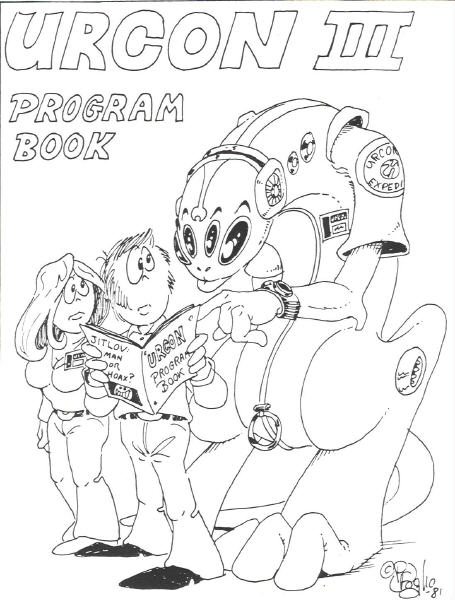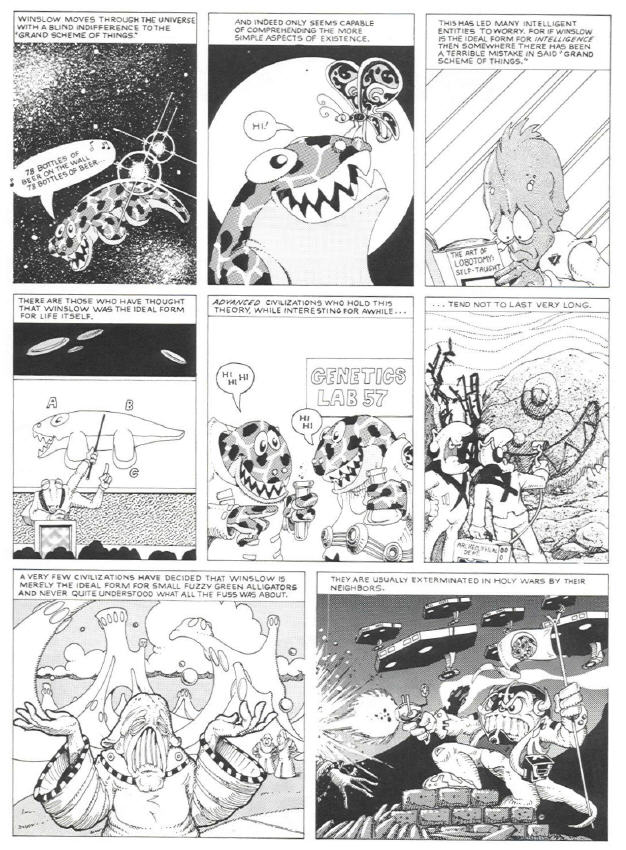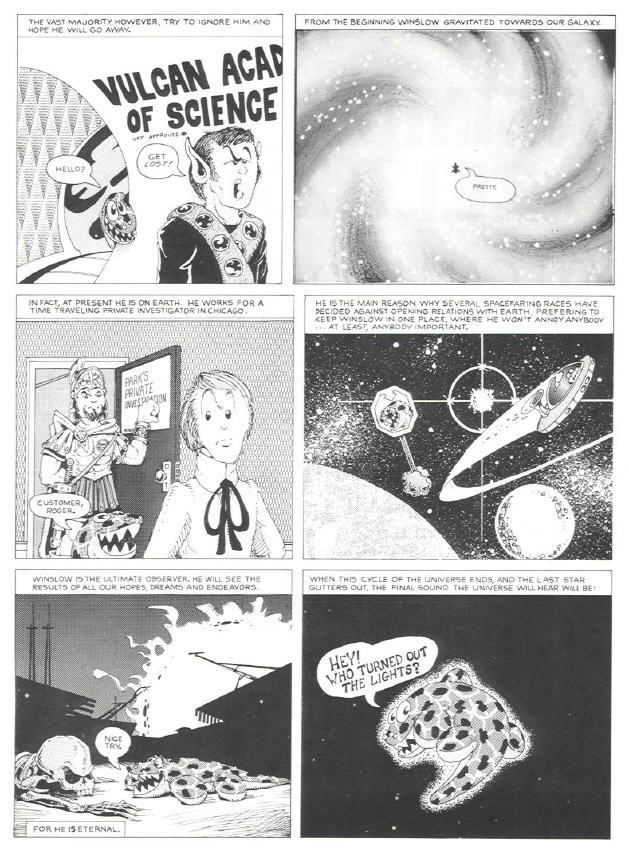And of course Foglio’s “Buck Godot: Zap Gun for Hire” series. Mercenary antiheroes in space are far from rare but I think the series was largely made by the setting: the planet New Hong Kong, which due to a hack of the AI drones policing most of known space had only one law– “There shall be no laws on New Hong Kong”. Thus you had an anarchist hive with a unique set of social customs.
I’ve never liked that song (The Devil went down to Georgia), because it is not consistent with Christian theology, or the whole Western European literary tradition. For how it should have worked out, see The Devil and Dan Webster
It’s more of a fae story, if you think about it.
I never had such a jolt. I’ve been following Foglio’s stuff since URCON II back in 1981, and read his three-page comic Winslow, which blew me away
Since then I’ve noticed how he’s slipped Winslow into a lot of his other works, including Buck Godot and Girl Genius.
I’m pretty sure that Winslow has the same origin as Tom Bombadil.
After watching clips of Inglourious Basterds I became curious about the gaudy gold medal that Hans Landa wears. Turns out it’s the Knights Cross of the War Merit Cross in Gold with Swords. That award was created in 1944 and never awarded to anyone. Having Landa be the recipient of an award that was never awarded in real life is a clever piece of background that shows we are watching a alternate history.
I figured it was structured to vibe with biblical text, so that “Rose Mary’s Baby” would be using ‘rose’ to mean ‘arose’, as in he rose up from Hell, or as a conqueror.
I remember thinking as a kid, “Johnny is so silly. He thinks he won, but he is all Pride and the devil will get him in the end”.
Until now, I honestly thought that was the point of the song - that the devil won regardless. I had zero clue that the performance was technically better for Johnny’s part!
(Even so, though, I think young me had it right. The devil baited Johnny into succumbing to Pride, and after winning that fiddle he’d have been all the way corrupted by that Pride.)
That actually makes sense. I never could understand how they could have a fiddle contest, or any subjective contest, without an independent judge. It just works out like kids playing army (back in the days we didn’t have nerf guns and just pointed sticks/ our fingers at each other) where both claim they shot first. "I WIN! " "NO, I WIN! ")
Whereas the Devil conceding now makes sense. It was never a fiddle contest, it was a trick to sucker Johnny by pride.
Yeah, I’ve always figured that theologically, the contest or contract or wishes or whatever should be meaningless. Merely agreeing to participate knowing who you are dealing with will damn you all on it’s own.
Phil who?
(Foglio not only did some illustrations for the novels, he did a full comic adaptation of the first book. It’s one of the few instances where an adaptation is significantly better than the original.
As Easter Eggs for fans of his other works, he slipped in cameos from a New Hong Kong police drone, and Winslow the eternal salamander.)
(Two and a half years later)
I recall reading a memoir decades ago on that. One phrase I remember was the story teller looking at the pristine mess hall just before the doors were opened, “with the same sad look a farmer gives his virgin daughter as the Vikings stride into view.”
I wonder if that was him.
Does “Green-eyed Lady” also have a hidden meaning?
I’ve heard this argument and it does have some appeal. But I figure you can just as easily make the counter-argument; what Johnny was doing was standing up to a challenge from the Devil and defeating him. Admittedly, this point would have been clearer if Johnny had defeated the Devil and then turned down the golden fiddle, thereby proving he had no secular motive. But I guess we can say that having won the spiritual battle, Johnny was receiving an earthly reward as well. A touch of prosperity gospel as it were.
As for the terms of the contest, I feel that as in any “deal with the devil” story there’s an unseen judge watching over events and enforcing the rules; God. The Devil has to follow the rules. If he breaks the rules, he doesn’t get the soul in question.
He was totally wrong, in case you havent guessed. One possible hidden meaning of “Green-Eyed lady” is that she is a sort of sea or nature spirit- maybe.
I was just watching the “Tubthumping” video and for the first time I noticed the band’s name was spelled Chumbawamba. I always thought it was Chumbawumba.
In Elizabeth Moon’s Paksennarion series, the setting’s version of “dark elves” are called Iynisin or kuaknom and aren’t just “evil elves”. They revolted against their nature and became inverted perversions of true elves, to such an extreme they have poisonous, corrosive blood.
I didn’t notice when I originally read it, but the narrative subtly reinforces how alienated they are from normal elves (and life in general) by never assigning them a gender. They are always referred to and thought of as “it”, which normal elves are not. Even people friendly to elves and have literally met an Iynisin for the very first time call them an “it”.
What made it subtle is that it was never called out or even noticed by the characters, which it why I didn’t notice it either. Nobody ever said “you call the Iynisin ‘it’” or made a conscious decision to do so; everyone just did, unthinkingly and automatically.
While posting to another thread, I ran across an video I uploaded to youtube 15 years ago. It’s probably not obvious to a lot of people, but at the time I had been watching a lot of old movies so I noticed this one right away.
I’m still surprised I managed to sync up and film both a laptop (on my lap) and the TiVo.
OK, for those of us not as familiar with old movies, what movie is that? Can’t read the YouTube title.
And did either or both have dialog, or was it just the music?




